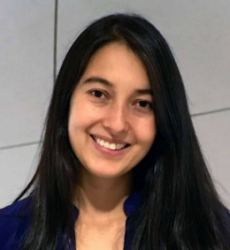Last month, Carolina Arias, an assistant professor of biology and researcher at UC Santa Barbara, earned this year’s Harold J. Plous Award for her extensive work in COVID-19 research.

Courtesy of the university
Established to honor the memory of Harold J. Plous, an assistant professor in the UCSB’s Department of Economics, the Harold J. Plous award is the highest honor a junior faculty member at UCSB can receive from the College of Letters and Science, recognizing awardees for outstanding performance and promise.
Arias’ award-winning COVID-19 research work involved “the development of the campus’s asymptomatic COVID-19 surveillance program, the establishment of a clinical-grade Clinical Laboratory Improvement Amendments laboratory for COVID-19 testing and the development of a program for genomic sequencing of the SARS-CoV-2 virus and the identification of its variants,” according to the UCSB Current.
Pre-COVID, Arias’ research lab worked with herpes and Zika viruses, searching for the mechanisms that these viruses use to take over cell systems and create proteins that allow them to multiply and divide. Within the last year, however, the lab has added SARS-CoV-2 to this list.
The lab, having been established for less than five years, took a hard hit during the onset of the pandemic, according to Arias.
“As a virologist, it was very hard for me to just be sitting idle and not respond,” Arias said.
Thus, she began reaching out to her colleagues and collaborating with other institutions, including the Santa Barbara Cottage Hospital and the Santa Barbara County Public Health Department.
“We have to do something, right? We have the expertise, we have the tools. We have the ways to try to figure something out that we can help with and try to address the crisis, especially for our community,” Arias said.
Arias realized early on in the pandemic that a reliable source of information was needed, and she also helped to interpret and translate credible information on COVID-19 into Spanish for UCSB’s Hispanic community.
“There was … so much misinformation that I consider it my work to go and see what is out there. What is the truth, and how could I transmit it to my community?” she said.
Arias said she wants to remind the world that scientists and professors are, in fact, people, too, and humanize them to students and the general population.
“Something that I’ve always tried to do in my classes and in my lab is I like to humanize scientists. I like to humanize professors. I like to show that we are people that go through challenges, and we are people that go through happy situations and know problems,” she said.
Arias was born and raised in Colombia, originally from the capital of the country, Bogotá. She moved to the United States when she was 21 years old. In 2016, she came to Santa Barbara with her husband and two children, attracted by both the natural environment of the area and academic environment of UCSB.
“I wanted to find a place where I could grow on both of those aspects: to grow in my scientific research and also grow as a mentor,” Arias said. “Santa Barbara offered a very unique environment where you have a lot of different disciplines that are people working together.”
Arias’ parents were also scientists: her father was a doctor of medicine and her mother was a clinical bacteriologist. With both of her parents working, Arias spent most of her time as a child with her grandfather, a construction worker, and her grandmother, a teacher.
“I think that environment — being exposed to the scientific side, especially from my mom and dad, and that curiosity kind of driven teaching from my grandma — showed me that you could do whatever you want,” Arias said.
Later, she found her passion working in the lab and decided to pursue microbiology.
“The sense of discovery — it never gets old. It’s this feeling when you know you are the first person seeing something,” Arias said regarding her favorite part about being in the lab. “The sense of wonder — no matter how much we think we know about a question, or a problem, or a system, there’s always a surprise in there.”
Currently, the professor co-teaches a few graduate courses at the university, including a class about gene expression regulation. In the spring, she is looking forward to teaching the undergraduate course general animal virology.
She believes that a major value in her career is training the next generation of scientists to be successful.
“There are different ways that we contribute. We have to help and to use our expertise for good to be able to help our community in a time of need,” she said.
“I don’t want another pandemic, but being able to live through this time and having had the chance to help and having had the chance to be able to use our skills and our minds for good was very meaningful for me,” Arias said.















